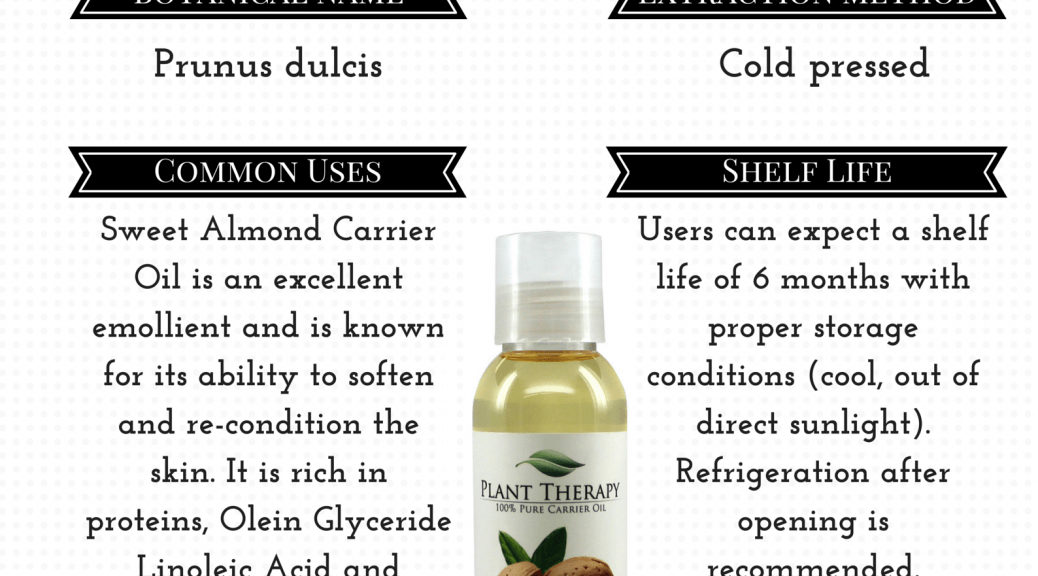
Carrier oils provide the backbone for many DIY creations. Choosing one that suits you best may seem intimidating, but I promise it’s worth the effort. The right carrier can make the difference between a newly made product that is good and one that is AMAZING. We’ve done a few posts previously on the benefits of various carrier oils, which you can find here:
This time we thought we could focus on the benefits of just Almond oil, as well as provide a few ideas for how you can make the most of the various uses for Almond oil. We all know how important it is to choose a carrier oil that is suitable for your skin type. Almond oil can be a wonderful choice for nearly everyone, making it the perfect option for those who want a great multi-purpose carrier to use in their projects and for blending. Almond oil is a light carrier oil that absorbs easily and doesn’t leave a greasy feeling on the skin. This spotlight (below) can be clicked and printed so you can add it to your essential oil binder!

Now, let’s take a closer look at what Almond Oil is!
Almond Oil, as you might have guessed, is cold-pressed from the almond kernel. Native to Europe, the Mediterranean, and California, the oil can range in color from colorless to pale yellow and has almost no scent of its own. Almond Oil can be used as the sole or base carrier for your blends, meaning it doesn’t need to be mixed in conjunction with others. Why is Almond Oil so great for your skin? It contains oleic acid, essential unsaturated fatty acids, sterolins, and even vitamin E. Why is this important? Let’s examine what these compounds can do for you & your skin:
- Oleic Acid Oleic acid is a fatty acid that occurs naturally in some vegetable and animal oils. It is a mono-unsaturated fat, making it a great choice for individuals who have skin prone to dryness, eruptions or redness. Oleic acid allows the skin to stay soft & supple by leaving a protective layer to fortify the skin against outside damage.
- Unsaturated Fatty Acids For amazing skin, unsaturated fatty acids provide elasticity and help to rejuvenate skin’s appearance.
- Sterolins Sterolins are skin-softening agents, useful to improve the appearance of skin and maintain a youthful glow.
- Vitamin E Often misrepresented as a preservative, in fact Vitamin E is an antioxidant which can extend the shelf life of products, but can not be relied upon to prevent bacterial growth. However, this is rarely a concern in oil-based products. Only with the introduction of water or water-based items should there be a concern for bacterial growth (Parker, 2015).
How can you incorporate Almond Oil into your aromatherapy routine?
Well, very simply, you can reach for it first when creating a new blend that requires dilution. Or check out one of these ideas for other great ways to use Almond Oil:
- When used as a massage oil, Almond Oil can be amazing in reducing muscle fatigue and tension. Since it is a protein-rich oil, it quickly rejuvenates tired muscles and gets you back on your feet faster after that tough workout or anytime you’ve over done it! Try this recipe for your sore muscles: To 1/3 ounce, or 10 mL of Almond Carrier Oil, add 1 drop Lemon, 3 drops Marjoram Sweet, and 5 drops Frankincense Carteri.
- For use in your Oil Cleanse Method – massage into the skin of the face for several minutes, cover with a warm, damp face cloth for a minute or so, then wipe away residual oil. You can combine with essential oils if you wish, or simply leave it plain.
- Nothing is nicer than having a warm bath and leaving with silky soft skin! Add 3 drops Chamomile Roman and 10 drops Lavender to an ounce of Almond Carrier Oil, and add a 1/2 teaspoon to your bath along with a handful of Pink Himalayan Salt for seriously soft and scented skin!
It’s important to note that if you have (or suspect) a nut allergy, you should probably avoid the use of Almond Oil or do a patch test to be certain it’s the right choice for you.
We’d love to hear how YOU benefit from Almond Oil. Share with us by leaving a comment here or contacting us via email at Aromatherapist@planttherapy.com. We also have a lively and FUN Facebook group for you to join over at Safe Essential Oil Recipes. We look forward to hearing from you soon!
Resources:
Parker, S. M. (2015). Power of the seed: Your guide to oils for health & beauty. United States: Process Media.









